Get Bonuses Next Season with Proper Training
BY Sandy Lender

Make training part of your professional culture for safe, quality asphalt jobs
How many times have you heard a veteran paver operator say something along the lines of “back in my day we didn’t use those newfangled computer controls” when discussing proper paving technique? He’s not wrong. There was a time not so many years ago when screed operators and the fellow up top pulled each lift with only their skill sets, communicating with one another to speed up or slow down to manage the head of material to put down a smooth, consistent mat. Nowadays the Asphalt Pavement Alliance (APA) gives Perpetual Pavement Awards to the state departments of transportation who still have those pavements in place after 35 years with no structural failures.
Think about that. After 35 or so years, the men and women who paved the nation’s ribbon of highways have likely retired. Even if those who were paving as recently as the 1980s or 1990s are still in the hot seat, how much longer are they going to be placing HMA? These veterans must hand down their knowledge to the next generation.
Let’s take a look at the knowledge base. Yes, these folks know how to pave the basics and do it right. As the spokesperson for Roadtec’s Paving Professionals Workshop pointed out, that might not be enough today: “The asphalt industry has changed drastically and the guards that have been doing this need more training to better understand what is now needed to meet all of the requirements. For example, 10 to 15 years ago the standards were to meet temperature and speed of paving, and make the correct amount of roller passes to meet the requirements for the specification. Today the contractor is just required to meet smoothness and density by whatever means necessary.”
Whatever means necessary includes automation, intelligent compaction and controls that take guesswork out of paving and asphalt production, too. But what happens when the screed operator steps up to the control panel and switches off the controls meant to assist him in achieving optimum quality? It doesn’t have to be that way. A contractor can get help for his crew. A producer can get training for his plant operators, lab technicians and others. This is true for any aspect of the industry.
“Transportation engineers and technicians today deal with a multitude of disciplines within the transportation field in order to make knowledgeable and informed decisions,” Don Watson shared. He’s a professional engineer at the National Center for Asphalt Technology (NCAT) at Auburn University. “The practical research and lessons learned through the NCAT research center and Test Track make it a valuable source of information involving the areas of structural design; construction methods; materials and testing; performance measurement and prediction; pavement preservation, rehabilitation, recycling, and maintenance; and environment and highway safety. Experienced instructors share this information with training course participants who return to their jobs with a greater appreciation for high quality construction in order to produce long-life asphalt pavements.”
One of the techniques consultants have found successful in teaching crew members is to leave the workers in their working environment to train them on equipment, technology or methods. Clarence Richard, the proprietor of Clarence Richard Companies, Minnetonka, Minnesota, has used web-based training combined with classroom training for years with quantifiable results, but has recently added a third branch to methods.
“I’m taking training full circle,” Richard said. He spends a full day at the plant site with operators and technicians, working alongside the crew members he’s training.
“I’m teaching them how to fish; I’m not fishing for them,” he said. “I’m teaching them how to watch their instrumentation. There are times when I arrive at the plant and their instruments aren’t working, and we can get them working. It’s like flying a plane; if your instruments aren’t working, you’re going to crash. We can electrically troubleshoot.”
This hearkens to the system John Ball, proprietor of Top Quality Paving and Training, Manchester, New Hampshire, uses for paving crews. Ball goes to the company that requests training, works alongside the paving crew, filming and photographing while teaching and training. After a couple days of this method, he reviews the video with the crew, going over their good work and pointing out areas for improvement. The classroom plays a roll in the learning for Ball’s students, but hands-on work alongside the employees to be trained is the name of the game.
Richard offers this on-site training whether the company allows the plant operators to participate in the classroom and web-based training or not, but he prefers they get that foundation. The off-site learning sets them up for success. When Richard gets to their site, he focuses on energy efficiency, but safety is covered in every step.
Savvy contractors incorporate safety training into every aspect of the job they can think of. Take Sanders Bros. of North Charleston, South Carolina, as an example. “We’ve created a safety training center at our headquarters and modeled industry-leading training for all employees,” management states. “Not a single worker arrives at a job site until they have spent a significant amount of time addressing safety topics. Our Critical Six program focuses on fatality prevention, and infuses a safety-first mentality into every team member, every day.”
Management doesn’t limit that training to fulltime employees. “Subcontractors or temp employees—folks we might know for only a short time—get 15 to 20 hours of in-depth training….Working safe benefits customers, employees and the community.”
Considering the importance of training for safety, uptime and quality, companies that emphasize training for their work force give themselves a competitive advantage in today’s marketplace. Veteran employees probably know exactly what they’re doing. But do they know what they’re doing with the new technology? Do they know how to teach new recruits who will be in charge of quality next season or the season after? In the next few pages, check out the training providers who took the time to respond to the questionnaire AsphaltPro sent out this summer, and find one that fits your schedule and your employee training needs to bring your crew up to bonus-worthy preparedness.
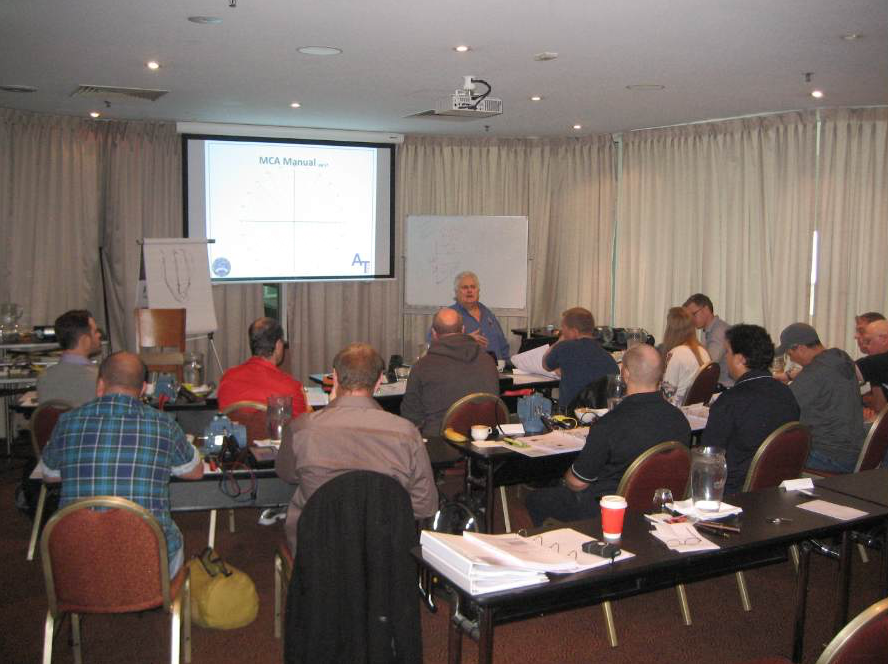
In the 5-day Motor Circuit Analysis and Electrical Signature Analysis Seminar, the students receive three days of MCA™ (de-energized) training preparing them to troubleshoot all type of electric motors, coils and windings. Two and a half days of ESA (energized) training then prepares them to evaluate many types of electric motor systems to improve the reliability and uptime of a plant. This public course is considered appropriate for both supervisors and technicians. Course materials include workbook, motor circuit analysis manual and pattern recognition. Breakfast and lunch are provided each day. Photo courtesy ALL-TEST Pro.
ALL-TEST Pro LLC offers the World Class Motor Diagnostic Workshops in various locations. Students will learn in the categories of plant operations and mechanics/equip repair.
- Oct. 31-Nov. 4
- Nov. 14-18
- Dec. 5-9
- Sept. 19-23
- Oct. 17-21
- Nov. 7-11
- Upcoming dates in 2017
Fee: $1,695 to $2,295
Students can earn CE units.
http://www.alltestpro.com/training.html
“Bill Kruger, world-renowned for his Theory and Application of Motor Diagnostics courses, will explain electric motor theory and operation in a straightforward, easy-to-understand manner. With this knowledge, attendees can then truly understand how to properly test all aspects of energized and de-energized motors. Upon conclusion of the course, students will have a comprehensive view of the principles and solutions needed to diagnose electric motor system issues. Additionally, they will be armed with the expertise needed to implement a reliable, predictive maintenance program in their facilities.”

The Astec training includes hands-on learning with real equipment for students. Photo courtesy Astec Inc.
Astec Inc. offers the Astec Advanced Customer Schools in The J. Don Brock Training Center in Chattanooga, Tennessee. Students will learn in the categories of plant operations and mechanics/equip repair.
- Jan. 9-12
- Jan. 16-19
- Jan. 30-Feb. 2 (ltd spaces for French speakers)
- Feb. 6-9 (ltd spaces for French speakers)
- Feb. 13-16 (ltd spaces for Spanish speakers)
- Feb. 20-23 (ltd spaces for Spanish speakers)
Fee: $1,050—this includes breakfast, lunch, snacks, dinner and evening entertainment
Astec Mobile Screens Inc., offers the ProTraining at the Astec Mobile Screens Training Center in Sterling, Illinois. Students will learn in the categories of paving/laydown, plant operations, lab/mix design/QC/QA, crushing/screening, mechanics/equip repair and supervisory/training the trainer.
- Oct. 18-20 – High Frequency Screen and ProSizer School
- Dec. 6-8 – Service and Application School
Fee: $299-$399—this includes breakfast and lunch for attendees
http://www.kpijci.com/support/pro-training/
“Almost all the training includes a combination of hands-on and classroom training.”
Bomag offers courses at the FAYAT Training Academy on the BOMAG campus in South Carolina. Students will learn in the categories of paving/laydown and mechanics/equip repair.
Courses include outdoor demonstrations and hands-on work with equipment.
There is no fee.
Brookfield AMETEK Inc. offers the Brookfield Viscometers/Rheometers Educational Programs at the Brookfield AMETEK Inc. training center in Middleboro, Massachusetts. Students will learn in the categories of plant operations and lab/mix design/QC/QA.
Courses provide hands-on work with equipment.
Fee: $395
http://www.brookfieldengineering.com/services/educational-programs/practical-course.asp
“The Brookfield Practical Course on Viscosity Measurements is a one-day seminar for users of Brookfield viscometers that covers basic use to methodology, rheology, calibration and hands-on testing.”
Caterpillar Inc. offers Paving Operations Training and AP1000F/AP1055F and AP600F/AP655F Service Training at the Caterpillar Paving Products Customer Solution and Learning Center in Maple Grove, Minnesota, and the Tinaja Hills Training Center in Tucson, Arizona. Students will learn in the categories of paving laydown, mechanics/equip repair and supervisory/training the trainer.
- Feb. 13-17
- Feb. 20-24
- Mar. 13-17
- Mar. 20-24
- Mar. 27-31
- Apr. 3-7
Fee for Paving Operations Training = $3,100
Fee for Service Training = $1,400
http://www.cat.com/paving/training-solutions
“The Paving Operations Training is a signature course. It’s a structured four-and-a-half day course that emphasizes the fundamentals of asphalt paving, and then builds upon these fundamentals to move into more advanced paving techniques. Attendees spend over 50 percent of their training time practicing techniques taught in the classroom using Cat pavers. With a student/instructor ratio of 2:1, attendees receive maximum learning opportunity in the classroom and during the hands-on activities. Attendees at the AP1000F/AP1055F and AP600F/AP655F Service Training class will demonstrate their understanding of classroom lessons on equipment in an indoor lab.”
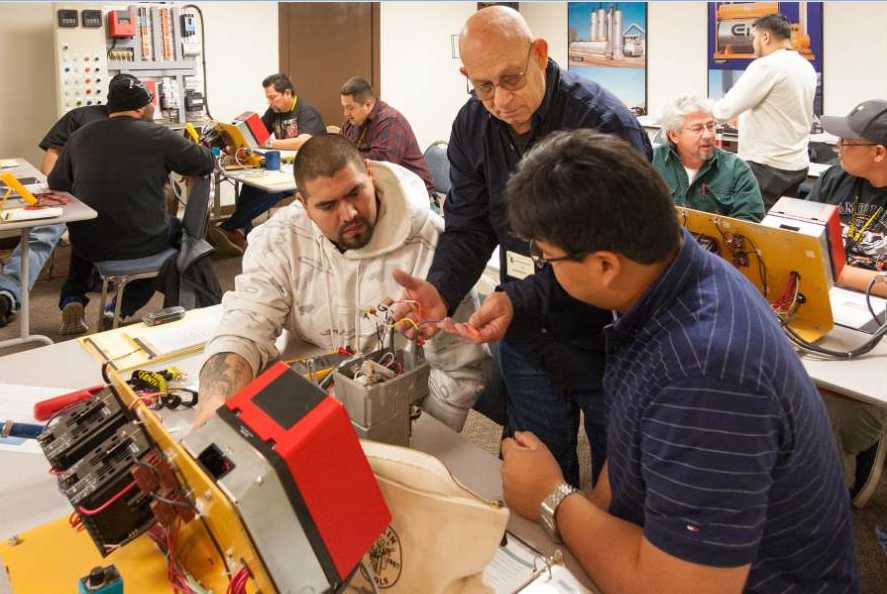
CEI service schools include outdoor demonstrations and hands-on learning in the classroom. Photo courtesy CEI Enterprises.
CEI Enterprises offers the Service School Seminars at the CEI Training Seminar in Albuquerque, New Mexico. Students will learn in the category of mechanics/equip repair.
- Jan. 9-12
- Jan. 23-26
- Feb. 6-9
- Feb. 20-23
Fee: $1,079
“The seminars are taught by CEI factory service technicians, CEI service management, CEI engineers, and frequently include vendor presentations. With the push for today’s asphalt plants to be safer, more energy efficient, more precise, and produce lower emissions, the equipment is becoming more technologically advanced. Because of that trend, it is very important for plant personnel to continually advance their knowledge and develop their skill sets to meet the needs of operating and maintaining this equipment.”
Clarence Richard Company Inc. offers the Clarence Richard Plant Operation Workshop and Clarence Richard Electro-Mechanical Workshop in various locations including customer plant sites. Students will learn in the categories of plant operations and mechanics/equip repair.
- Feb. 20 – Nashville
- Feb. 26 – Minneapolis
- Mar. 6 – Denver
On-site plant training includes hands-on work with equipment.
Students receive CE units for courses.
Fee: $1,500 – includes breakfast
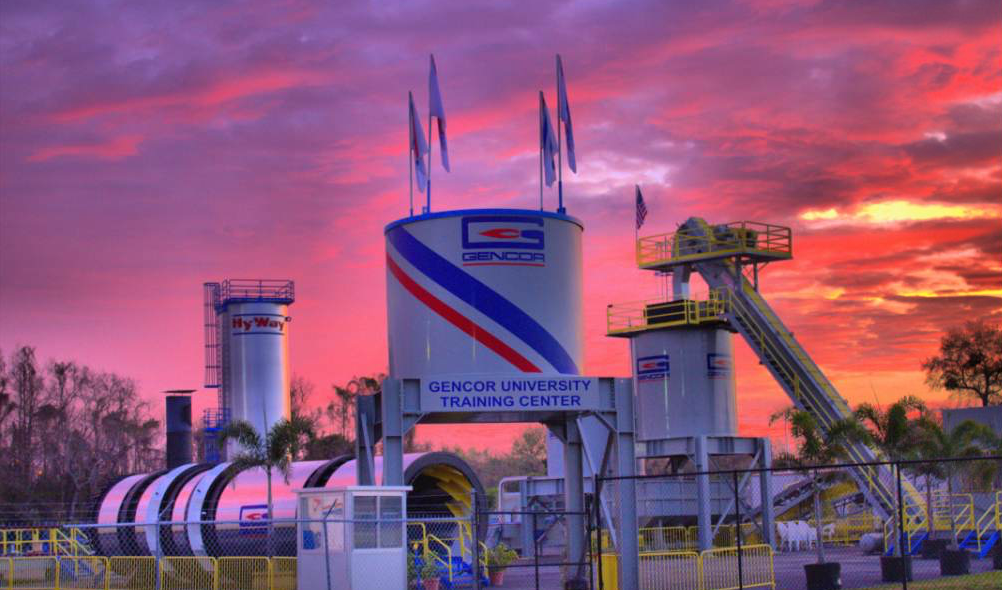
This will be Gencor’s 47th year of training. “We continually adjust to challenges our customers are facing, but one thing never changes: Our hands-on approach. Those who go through our training programs benefit from real experience with real equipment.” The courses provide both outdoor demonstrations and hands-on work with equipment for students.
Gencor Industries Inc. offers the Gencor Advanced Training School at the Gencor University Training Center in Orlando, Florida. Students will learn in the categories of plant operations and mechanics/equip repair.
- Jan. 30-Feb. 3
- Feb. 6-10
- Feb. 13-17
- Feb. 20-24
- Fee: $950-$1,000
http://www.gencor.com/index.php?page=training
“Years ago, Gencor adopted the philosophy that providing ‘self-help’ through training is the most efficient way to address plant-downs. Quite simply, experience has taught us that well-trained plant personnel can respond more quickly and efficiently, even if a Gencor service technician is located nearby. In the process, we also learned that in-depth training made better, more confident operators who are much less dependent on expensive service calls…”
Hauck Mfg. Co. offers the Asphalt Product Maintenance Seminar at the Maxon training center in Muncie, Indiana. Students will learn in the categories of plant operations and mechanics/equip repair.
- Jan. 10-12
- Jan. 17-19
- Jan. 24-26
- Seminars include hands-on work with equipment.
Fee: $950 – includes breakfast and/or lunch during days of the seminars
www.elster-thermal-solutions.com
“Don’t risk unnecessary downtime and lost production. Training you and your staff with the operational knowledge of your Hauck combustion and control equipment can aid you in quickly diagnosing problems and getting back into production without delay.”
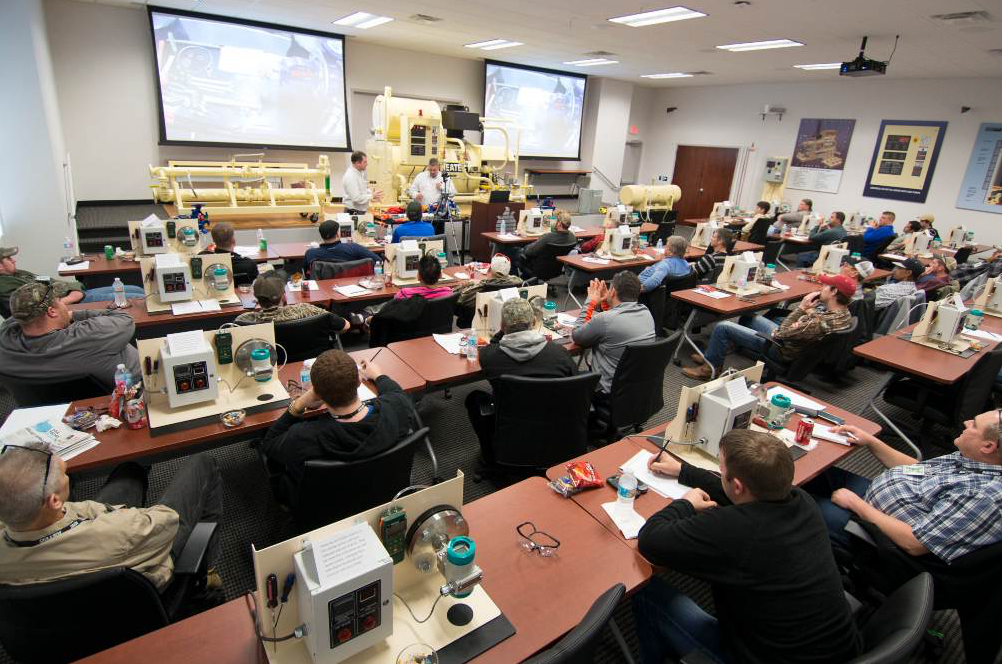
“We designed and built special training devices that simulate controls of asphalt heaters and storage tanks. Students operate controls on the devices to simulate normal and abnormal conditions they may encounter during operation of equipment at their plants.” Photo courtesy Heatec Inc.
Heatec Inc. offers a day of training during the Astec Advanced Customer School at the Heatec Training Center in Chattanooga, Tennessee. Students will learn in the categories of plant operations and mechanics/equip repair.
- Jan. 10
- Jan. 17
- Jan. 31
- Feb. 7
- Feb. 14
- Feb. 21
The courses include outdoor demonstrations and hands-on work with machines.
Fee: included in Astec school fee
“Training is the key to safe and efficient operation of equipment at asphalt plants. Training enables you to learn from the experience of others without making the same mistakes they have made.”
Johnson Crushers International offers the PRO Training at the Johnson Crushers International Training Center in Eugene, Oregon. Students will learn in the categories of plant operations, crushing/screening, mechanics/equip repair and supervisory/training the trainer.
Fee: $299-$399—this includes breakfast, lunch and one hosted evening event during the week
http://www.kpijci.com/support/pro-training
“We do hands-on tear-down and reassembly of actual equipment at many of our factory schools. We have also invested in designing and building portable working models and hands-on trainers that students can work with such as functional electrical harnesses and control system and Hydraulic systems.”
Kolberg-Pioneer Inc. offers Professional, Results Oriented (PRO) training at the Scheid-Iverson Training Center in Yankton, South Dakota. Students will learn in the categories of plant operations, crushing/screening, mechanics/equip repair and supervisory/training the trainer.
Most courses have a 50/50 split between classroom time and hands-on experience both indoor and outdoor.
Fee: $299-$399
http://www.kpijci.com/events/?c=pro-training#jumptitle
“Our signature course is the Service/Application Course. It opens the door to any and all levels of knowledge in the aggregate processing industry. This course allows service technicians to look outside the box of a failed component in the processing spread and see the true reason for the failed component. In most cases today, the technician only replaces the component and doesn’t fix the reason why it failed. Simply by seeing the limitations of the equipment shows a true path to resolving not just a failed component, but also to fix the entire machine to operate at its highest level of production. We have certified on-staff service employees handle the training. In addition, we invite local (CAT) and (Cummins) speakers along with other Vendor professionals and factory field service technicians. These instructors are the champions in their field of work and carry vast levels of knowledge that are given to the class attendees at their own level for ease in understanding the content better.”
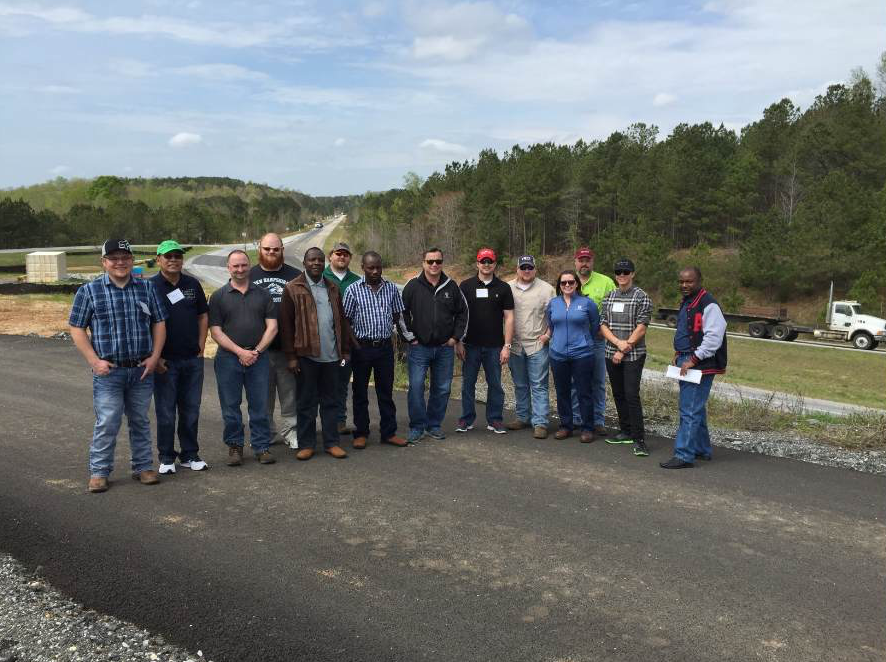
One of the training groups from NCAT shows pride in learning about asphalt. Photo courtesy NCAT.
The National Center for Asphalt Technology (NCAT) offers the Asphalt Industry Training Program at NCAT in Auburn, Alabama. Students will learn in the categories of paving laydown and lab/mix design/QC/QA.
- Jan. 24-26 – Advanced Mix Design
- Feb. 14-16 – SMA/OGFC Mix Design
- Feb. 20-24 – Asphalt Technology
- Mar. 14-16 – Asphalt Balanced Mix Design
- Mar. 27-31 – Superpave Mix Design
- Apr. 17-20 – Superpave Binder Testing
The course provides a demo of the equipment, but the mix design courses and the binder course will provide hands-on time for sample preparation and several lab tests.
Fee: varies
CE units are offered.
“The Asphalt Technology Course provides an overview of asphalt pavement design, mix design and materials, production and construction, maintenance, preservation, and recycling, and performance testing. This gives participants a broad knowledge of all that is involved in the life of a pavement from beginning to end so they can better see how all the pieces fit together. It helps suppliers and manufacturers better understand some of the challenges and needs of their customers, and helps contractors and agency personnel better understand how changes in mix type and quality affect pavement performance.”
Roadtec Inc. offers the Paving Professionals Workshop and the Service Schools in Chattanooga, Tennessee. Students will learn in the categories of paving/laydown, mechanics/equip repair and supervisory/training the trainer.
- Jan. 11-13 – Paver School
- Jan. 16-18 – Paver School
- Feb. 1-3 – Mill School
- Feb. 6-8 – Mill School
- Feb. 14-15 – Shuttle Buggy School
- Feb. 16-17 – Shuttle Buggy School
- Feb. 22-23 – Stabilizer School
The courses include hands-on work with equipment.
Fee: $150-$495
Special instructors for the Paving Professionals Workshop include John Ball of Top Quality Paving and Training; Brian Horner of E.D. Etnyre Inc.; Scott Hall of Oldcastle; Richard Kramer of Roadtec; and Charles Butler of Roadtec. The signature Paving course includes teaching from hands-on in-field experience the instructors have had with a wide variety of contractors and manufacturers.
All teachers for the Service Schools are Roadtec service technicians who have been trained extensively on the equipment. “These classes teach the customer how to perform maintenance and repairs to minimize downtime and get the best performance out of their machines.”
“The industry is losing a lot of its best trained professionals. There are not enough young people getting into this industry. I have seen that the people that are getting into the asphalt industry have been trained by the veterans who are near retirement, and may not have had enough training with the newer standards of today’s needs. … The industry has really changed and we all have to get information and training to keep up in order to meet all the specifications.”
The Rocky Mountain Asphalt Education Center (RMAEC) offers training and certifications at the RMAEC in Centennial, Colorado. The certifications are done under the Laboratory for the Certification of Asphalt Technicians (LabCAT). Students will learn in the categories of paving/laydown, plant operations, lab/mix design/QC/QA and supervisory/training the trainer.
Dates are run on a calendar year basis.
Fee: varies
TransTech Systems Inc. offers Non-Nuclear Density Gauge Training at TransTech Systems Inc. in Latham, New York, near Albany. Students will learn in the categories of lab/mix design/QC/QA and supervisory/training the trainer.
Dates are available upon request
Fee: none
http://www.transtechsys.com/products/index.php
“Qualified and competent density technicians are a vital part of your paving business. TransTech Systems’ training not only covers use of the non-nuclear density gauges, but also how to be successful in achieving proper asphalt compaction.”
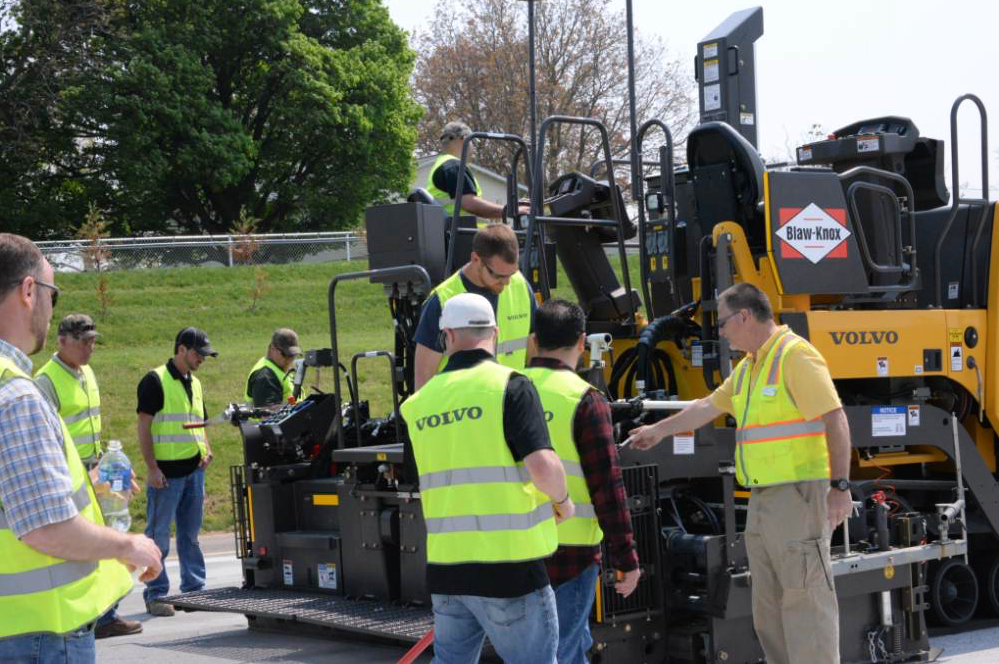
“Our most popular course is Paver and Compactor Operation and Maintenance. We have a number of paving teams who have sent multiple team members to the course, and many have repeated the course to stay up to date on trends and best practices in road paving. The course gives students a solid balance of classroom theory and hands-on operating practice where they can apply what they’ve learned in the classroom. In addition to our experts’ perspectives, students often learn a lot from one another, which helps generate discussion throughout the course both in the classroom and while working through paving techniques in hands-on sessions. Road Institute updates the curriculum regularly to ensure trending technologies and practices are covered, so all students—from new operators to 25-year veterans—can take away lessons that apply on the job.” Photo courtesy Volvo Road Institute.
Volvo Construction Equipment offers the Volvo Road Institute® at the Road Institute® in Chambersburg, Pennsylvania; Shippensburg, Pennsylvania; or Phoenix, Arizona. Students will learn in the categories of paving/laydown and mechanics/equip repair.
- Oct. 11-14 – Paver and Compactor Operation and Maintenance
- Oct. 25-28 – Paver and Compactor Operation and Maintenance
- Nov. 1-2 – Paving and Compaction Application Seminar
- Nov. 8-9 – Soil Compaction Application Seminar
- Nov. 16-18 – Paver Screed Operation and Adjustment
- Nov. 29-Dec. 2 – Paver and Compactor Operation and Maintenance
- Dec. 5-9 – Paver Hydraulic and Electrical Systems – P7000 (Step 1)
- Dec. 13-15 – Large Asphalt Compactor Mechanics
- Dec. 13-16 – Paver and Compactor Operation and Maintenance
- Jan. 4-6 – Automatic Grade and Slope Systems
- Jan. 9-13 – Paver Hydraulic and Electrical Systems – P7000 (Step 1)
- Jan. 10-12 – Soil Compactor Mechanics – Step 1
- Jan. 17-19 – Paver Screed Operation and Adjustment
- Jan. 24-26 – Large Asphalt Compactor Mechanics
- Jan. 24-27 – Paver and Compactor Operation and Maintenance
- Jan. 31-Feb. 3 – Paver and Compactor Operation and Maintenance
- Feb. 6-10 – Paver Hydraulic and Electrical Systems – P7000 (Step 1)
- Feb. 14-16 – Soil Compactor Mechanics – Step 1
- Feb. 14-17 – Paver and Compactor Operation and Maintenance
- Feb. 21-23 – Automatic Grade and Slope Systems
- Feb. 28-Mar. 3 – Paver and Compactor Operation and Maintenance
- Mar. 7-9 – Small Asphalt Compactor Mechanics – Steps 1 and 2
- Mar. 14-16 – Large Asphalt Compactor Mechanics
- Mar. 21-24 – Paver and Compactor Operation and Maintenance
- Mar. 28-30 – Paver Hydraulic and Electrical Systems – P7000 (Step 2)
- Apr. 11-14 – Paver and Compactor Operation and Maintenance
- Apr. 18-19 – Paving and Compaction Application Seminar
- Apr. 25-28 – Paver and Compactor Operation and Maintenance
- May 9-12 – Paver and Compactor Operation and Maintenance
- May 16-19 – Paver and Compactor Operation and Maintenance
“Our Paver and Compactor Operation and Maintenance course includes about two days of outdoor hands-on and demonstration time with the pavers and compactors. Instructors review best practices in operation, and then each student has an opportunity to receive one-on-one instruction in the machine, as well as team instruction rotating roles on the paver and compactors. All sessions that aren’t seminar-only include hands-on elements to ensure students are able to apply the lessons they are taught in the classroom sessions. We feel learning is definitely enhanced when a student can move directly from theory to hands-on practice.”
Fees: $500-$900
Special instructors include Wayne Tomlinson, Flemming Knudsen, Gustavo Marin and Stan Rakowski. “Wayne Tomlinson has 27 years of experience in roles related to equipment service, system specification and training. In 1999, Wayne joined the road machinery business as a technical service representative assisting dealers and customers with compaction products. In 2004, he joined the Road Institute as the compaction training specialist conducting operation and applications training for asphalt and soil compaction products.
“Flemming Knudsen has 42 years in the construction equipment industry and 26 years with paving specifically. Most of his career was spent as a trainer and field product support representative. He joined Volvo and the GCD training group as a paver specialist in 2008 and recently joined the Road Institute full time focusing on paver operator and service training.
“Gustavo Marin has more than 15 years of technical experience and a broad range of knowledge and skills around electronics and diesel engine software and hardware development. Since 2011, Gustavo has served as product support engineer for road machinery equipment in VCE Latin America, located in Curitiba, Brazil.
“Stan Rakowski has worked for manufacturers of compaction and road building equipment since 1979, and has 35 years of factory and field experience with compaction equipment. He began working as a service representative for a compaction equipment manufacturer traveling extensively for new machine start-up, operator training and service training for dealers and customers and to solve problems in the field. Duties also included production of technical manuals and teaching of efficient operating methods and best practice techniques to improve quality of asphalt pavements. He joined Volvo and the GCD group in 2011 and has joined CST in 2015, focusing on compaction and skid steer training.”
 Wirtgen America Inc. offers a school at the Center for Training & Technology (CTT) in Antioch, Tennessee. Students will learn in the categories of paving/laydown, crushing/screening and mechanics/equip repair.
Wirtgen America Inc. offers a school at the Center for Training & Technology (CTT) in Antioch, Tennessee. Students will learn in the categories of paving/laydown, crushing/screening and mechanics/equip repair.
Aug. 30, 3016-May 24, 2017
Courses include outdoor training/demonstration. “Laboratory simulators are used in classroom training, machines are examined and operated in outdoor training/demo area; and a four-bay shop is used for mechanical training.”
Fee: varies – includes some meals
www.wirtgen-group.com/america/en-us/customer-support/training
“We’ve established the Center for Training & Technology as our training facility,” said Jan Schmidt, vice president, product support. “In 2016 we’re changing the name and mission to reflect the rebranding of Wirtgen Group, and to harmonize its name and acronym as a global concept with training facilities at our factories in Germany and regional facilities around the world.” The change in name brings changes in curricula for customers and distributors. “It’s just part of a number of changes that we are excited to implement in coming years,” Schmidt said. “Our training program here in North America is in its 25th year. It started out focused on end users, and then transitioned into a new direction when we grew our dealer network. In order to develop the competence at the dealer level we needed to shift resources and curricula toward distributor offerings as well as those for end users, but our mission has always been predominantly about technical training.” That includes equipment operation, field applications, troubleshooting, disassembly and repair, and maintenance. Sales training and special events also have been conducted at the Nashville training facility. But the mainstay of the learning center has been technical training, so the role of CTT long-term will be expanding from that core.
